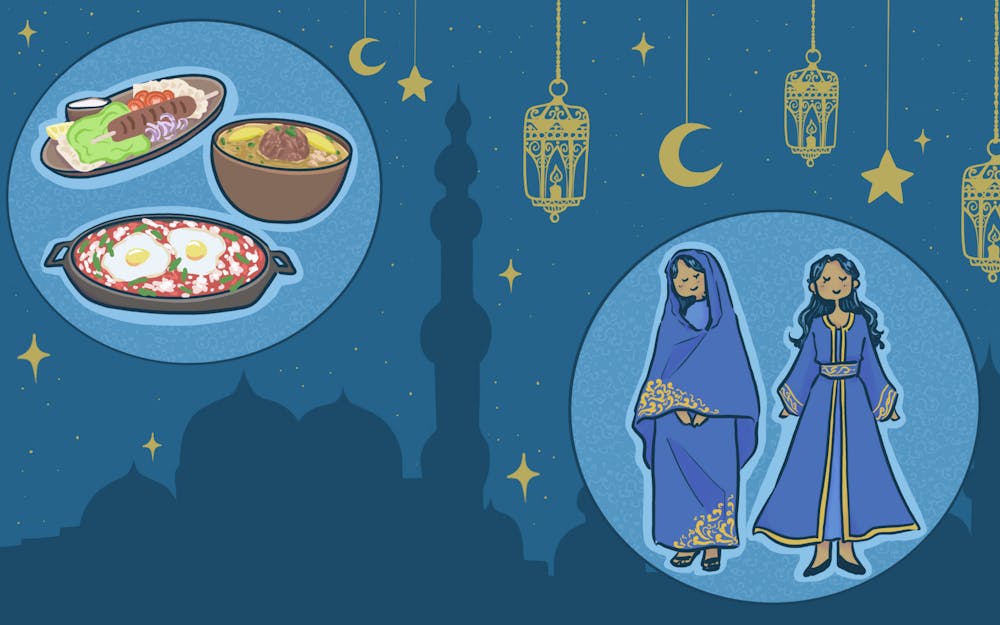In 2017, the Arab America Foundation began the National Arab American Heritage Month initiative. It wasn’t until 2021 that former President Joe Biden officially recognized the month of April as Arab American Heritage Month with a commemorative letter to the Arab America Foundation.
Arab American Heritage Month acknowledges the culture, history and contributions of Arab-Americans to the United States. IU offers year-round programming to learn Arabic and understand the culture.
The IU Arabic Flagship Program is a federally funded organization in the Hamilton Lugar School. It provides the opportunity to reach superior-level fluency by completing Arabic coursework, working with tutors and providing opportunities to spend a year abroad in Meknes, Morocco. The students in the program are also required to attend cultural training.
Iman Alramadan, director of cultural and co-curricular activities for the IU Arabic Program, emphasized the importance of learning the culture and language together.
“Studying language is not separate from studying culture,” Alramadan said. “Bringing this idea to IU will help foster awareness and combat stereotypes. Cross cultural understanding helped me a lot to be the person who I am now, and it’s opened to door to a lot of unity.”
Alramadan is originally from the Syrian Arab Republic, a country located in the Middle East. In the past 14 years, the Syrian civil war has been an ongoing conflict. However, Alramadan remembers her home country more fondly.
“I tell people about Syria before the war,” Alramadan said. “The Syria of the jasmine, and of the rich history. I love to show my culture so they can have an idea about it through their communication with me and not what they see in the news or in the media.”
Nader Morkus, academic director of the IU Arabic Flagship Program, says that part of the goal of the program is to provide an immersive experience for the students apart of it.
“It’s just fascinating when you see students learning new things every day about Arab culture,” Morkus said. “Whether it’s the communication style or the traditional clothing, I see them grow a develop a deeper, deeper understanding of the Arab culture.”
Morkus is from Alexandria, Egypt, where the official language is Arabic. He graduated college and worked for three years before moving to the U.S. at 26. Despite the initial culture shock like seeing a squirrel for the first time outside of a zoo, he felt privileged to be able to still speak and teach Arabic to students and introduce others to the culture.
He still goes back every couple of years and maintains strong ties with his family back home, something that he believes the Arab culture values significantly.
“Even here in the Arabic Flagship, there is a strong sense of community and family, and that’s a beautiful thing,” Morkus said.
Sophomore Shraddha Krishnan, a student in the Foreign Language and Area Studies fellowships, said she felt she saw a similar value of family when talking to a student from Jordan, a sovereign state in Southwest Asia.
As a part of the fellowship, she took part in a cultural exchange program. She would meet every other day on Microsoft Teams with her partner and speak to them in Arabic.
“It was so cool to see how similar but also like how completely different our lives are,” Krishnan said. “They are super family oriented, even if they aren’t blood related to somebody the essence of family is still super strong.”
Aside from work inside the classroom, learning Arabic and studying the culture has changed Krishnan’s understanding of the world.
Two weeks ago, she went to a Lebanese restaurant and started speaking Arabic with the waiters. A few hours later, she learned when the restaurant started, and became friends with the workers.
“I’m going to appreciate the culture and try to learn as much as I can from it, and it’s really just the most authentic way to understand somebody else,” Krishnan said.
Moving forward, the IU Arabic Flagship Program plans to continue to celebrate Arab heritage by sharing culture with students. They are planning a closing ceremony in May for the flagship where students will be able to display different aspects of culture they have learned, such as poetry, music and dancing.
“Arabs are part of the American fabric,” Alramadan said. “When it comes to Hamilton Lugar School, once you enter the door you will smell different cultures and the richness. I feel like I belong.”




